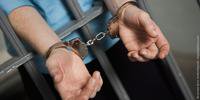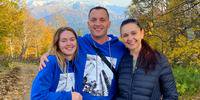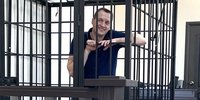The Case of Saparov in Maykop
Filter
- #
The Investigative Department of the Investigative Committee for the Republic of Adygea initiates a criminal case against Nikolai Saparov. He is charged with committing "a deliberate grave crime directed against state power." This is how the investigation interprets the peaceful worship services of Jehovah's Witnesses.
On the night of March 23, FSB officers detained Nikolai at the Mineralnye Vody international airport and placed him in the temporary detention facility in the city of Maykop. The believer is interrogated and charged with committing a crime under Part 1 of Article 282.2 of the Criminal Code of the Russian Federation.
- #
Judge of the Maykop City Court Alexander Sereda satisfies the petition of the investigator of the Investigative Directorate of the Investigative Committee for the Republic of Adygea, Murat Shnakhov, to detain Saparov until May 22, 2022.
- #
It becomes known that the believer is being held in pre-trial detention center No. 2 in the Republic of Adygea in the village of Tlyustenkhabl.
- #
The case of Nikolay Saparov is submitted for consideration to the Maykop City Court of the Republic of Adygea. It is appointed to Judge Aleksander Sereda.
- #
At a hearing in the Maykop City Court, the defense asks the court to soften the measure of restraint for Nikolai Saparov due to the fact that the collection of evidence and the preliminary investigation have been completed. In addition, Saparov has no previous convictions and is characterized as "an honest, sympathetic, tactful person, a strong family man, fair, peaceful and kind." Despite this, Judge Aleksandr Sereda prolongs the believer's detention.
- #
23 people come to the courthouse to support Nikolai Saparov.
The lawyer challenges the judge. In his opinion, the impartiality and objectivity of Aleksandr Sereda, who had twice extended Saparov's detention in a pre-trial detention center, are questionable. Thus, in his decisions, the judge used wording that indicates the guilt of the defendant, although this has not yet been proven by the court. The judge shall grant the motion for his recusal.
- #
Consideration of the criminal case is resumed under the chairmanship of a new judge, Alexei Nikandrov. The court rejects the defense's motions to return the case to the prosecutor and to admit Saparov's wife as a public defender.
- #
The prosecutor reads out the indictment.
Nikolay Saparov speaks with an attitude to the accusation. He pleaded not guilty and stated: "I did not and could not have had a motive of hatred or enmity. My life, as well as the actions that I am accused of, are exclusively peaceful."
The interrogation of a secret witness begins, who admits that during his acquaintance with Nikolai Saparov, he never showed aggression in words or behavior, did not force him to any actions, did not threaten him or other people.
When asked whether Saparov ever called for violence, disrespect or harassment of anyone on the basis of religious affiliation, the witness answered in the negative. He also states that Jehovah's Witnesses consider their religion to be the only true religion. At the same time, he does not remember Saparov expressing the idea of the superiority of his religion over others.
A secret witness declares that the local congregations of Jehovah's Witnesses belong to the Maykop LRO. Nikolay Saparov draws the court's attention to the fact that the witness does not understand the difference between the legal entities of a religious organization and its canonical structure and bases his testimony on his own assumptions.
At the next hearing, another secret witness is scheduled to be questioned.
- #
16 people are allowed into the meeting room.
A secret witness under the pseudonym "Semyonov Oleg Evgenievich" is being interrogated. He says he knows the defendant at work. Giving Saparov a description, "Semenov" states that the fact that the defendant refused to attend the event to which he invited him on the first day of acquaintance, prompted him to the idea that Saparov leads a closed lifestyle and in "this religion events and holidays are prohibited, they communicate only in their own circle."
When asked by the lawyer whether Saparov showed any aggression or threats against him, the witness replies that all communication on the part of Saparov was formal, only on work issues, and that there was no aggression on his part, but despite this, the witness refuses to continue the interrogation in the courtroom, as he fears "for his safety and the safety of his loved ones."
When asked by a lawyer whether the witness understands the difference between a legal entity and a religion and what was forbidden, the witness replies: "Religion, well, I think so." The witness refuses to answer many other questions from the lawyer without explaining his position in any way or saying that he does not remember, although at the beginning of the interrogation he characterizes his memory as "perfect". When asked by the lawyer how he feels about the religion of Jehovah's Witnesses, the witness replies that it is negative.
- #
The study of the case materials, including the viewing of video recordings of liturgical meetings, continues. 12 people come to support the believers.
- #
As part of the hearing, a defense witness is questioned as a measure of restraint.
The case has been assigned to a new judge, Zaurbiy Birzhev. 8 people come to support the believer.
- #
Saparov's lawyer filed a petition for admission to the defendant's wife as a public defender, but the court rejected it.
The prosecutor reads out the indictment.
- #
The judge asks Saparov if he understands the essence of the charge, to which he replies in the negative. The defendant asks the prosecutor the following questions: what specific actions did he commit? What were his motives in committing these acts? What socially dangerous consequences did this entail? In this regard, the lawyer submits a petition for clarification by the prosecutor of these issues, but the court rejects it. Then the lawyer submits a motion to return the case to the prosecutor, and he asks to give him time to familiarize himself with the petition until the next meeting.
- #
The court rejects the request to return the case to the prosecutor. Saparov speaks with an attitude to the accusation.
The study of the case materials begins.
- #
Prosecution witnesses are being questioned. In their testimonies, they say that they have a negative attitude towards the religion of Jehovah's Witnesses.
The first secret witness had previously attended services of Jehovah's Witnesses and was acquainted with Nikolai Saparov. According to him, the defendant did not call for violence, did not show any signs of aggression and did not extol his religion. The witness did not hear any threats against him, and he was not forced to become a member of any organization.
The witness under the pseudonym "Semyonov" says in his testimony that he has known Nikolai Saparov since 2020 at work and has seen him dozens of times. However, he could not name the exact company of which the defendant represented, despite the fact that they had entered into and signed a number of sales contracts. At the same time, the witness remembers for sure that Saparov belonged to an "extremist organization".
- #
The lawyer files a motion to exclude from the list of evidence the conclusion of a comprehensive psycholinguistic examination performed by Ruslan Levinsky.
The defense justifies this by the fact that the evidence was obtained in violation of the criminal procedure law and is inadmissible, therefore it cannot be used as the basis for Saparov's accusation.
The defender points out that, firstly, when appointing such an examination, questions of a legal nature should not be raised before a specialist, because they are not within his competence; Secondly, the expert should not give a legal assessment of the actions of the defendant.
- #
The court rejects the petition to exclude from the list of evidence the conclusion of a comprehensive psycholinguistic examination.
The defender submits to the court the conclusion of the commission of specialists of the Adyghe State Public Association of Expert Linguists for Levinsky's examination, which states: "In view of the presence of significant violations of the procedure for conducting a comprehensive examination ... lack of scientific and methodological validity ... the expert's going beyond his competence, refusing to use special linguistic research methods ... Levinsky's conclusion does not correspond to the principles of objectivity, comprehensiveness and completeness of the study. The conclusions of this examination are not reliable."
The commission also notes that Levinsky does not have a higher professional education in the field of linguistics, but single-handedly conducted a comprehensive psycholinguistic examination, which, according to the law, can only be carried out by experts of various specialties.
The commission's conclusion states that Levinsky "examines the creeds of Jehovah's Witnesses, the structure of the organization, demonstrates his personal attitude to this creed, although this is not part of his tasks ... draws categorical conclusions, while the expert does not give examples of what kind of replicas or communication features Saparov uses.At the request of the lawyer, the court attaches the opinion of the expert commission to the case file.
- #
Defense witnesses, two of Nikolai Saparov's colleagues, are being interrogated. Men describe Saparov as a responsible, competent employee, sociable, with a good sense of humor, always ready to help. They say that they enjoyed playing volleyball and football together.
- #
The court examines material evidence, in particular, the program of liturgical meetings.
The lawyer draws the court's attention to the fact that it deals only with the services of Jehovah's Witnesses, the discussion of biblical passages, the influence of the Bible on the life of a Christian; and the fact that Jehovah's Witnesses around the world, not just in Maikop, adhere to this program.
- #
A hearing is being held on the measure of restraint. The lawyer argues that Saparov has strong social ties, lives with his wife and minor daughter, and is positively characterized by others. He also asks the state prosecutor to give specific reasons why he believes that Saparov's detention should be extended: "The state prosecution says that the grounds have not changed and have not disappeared, but we do not hear ... what circumstances have not changed and have not disappeared."
The court does not take into account the arguments of the lawyer and extends Saparov's detention.
- #
The court examines physical evidence - films about young people, about alternatives to blood transfusions, about the educational and volunteer activities of Jehovah's Witnesses around the world.
- #
The court extends Saparov's preventive measure for another three months - until February 3, 2024.
- #
The defense filed a motion for the interrogation of two witnesses, since the legality of the search procedure raises doubts among lawyers. The judge rejects it.
The lawyer requests the interrogation as witnesses of the persons who participated in the search. They observed the actions of the investigator and detectives who conducted the search and can give answers to questions of interest to the defense. The court sees no grounds for questioning witnesses.
- #
The court is interrogating Nikolay Saparov. He says that after his detention at the Mineralnye Vody airport, he was subjected to violence, including the use of a stun gun, who was forced to take the blame for extremism. According to the believer, he was pushed into a car and taken about 300 km to the law enforcement department in Adygea. Along the way, he was beaten and intimidated.
After the interrogations, first in the building of the local department of the Federal Security Service, and later in the building of the branch of the Investigative Committee, Nikolai Saparov was taken to his home for a search, which, according to the defendant and his lawyer, took place with violations, including without witnesses. As a result, investigators "found" documents and items in Saparov's house that did not belong to him.
The lawyer filed a motion to exclude the search protocol from the case file, arguing that the search at Saparov's place of residence was carried out by the investigating authorities with numerous violations of the criminal procedure legislation. The defender draws the court's attention to the fact that investigator Shnakhov allowed the uncontrolled movement of operational officers around the house, which is a significant violation. This does not exclude the planting of documents and objects that were "discovered" in Saparov's house. The judge rejects the motion of the defense to exclude the search protocol from the case file.
- #
The prosecutor requested a sentence for the defendant: 7.5 years in a general regime colony. Nikolay Saparov makes his final statement. The court pronounced the sentence: 6 years in prison.
The last word of the defendant Nikolay Saparov in Maykop - #
- #
Nikolay Saparov is in the PFRSI at Correctional Colony No. 1 in the Republic of Adygea.
During the entire time in prison, the believer received about 3000 letters. He has the opportunity to read the Bible and receive visits with his wife.
Saparov is being held in a four-bed cell. Cellmates and the administration of the colony treat Nikolay with respect. He has no penalties.
- #
- #
Nikolay Saparov is in the pretrial detention facility located at Penal Colony No. 1 for the Republic of Adygea.
- #
There are about 130 people in Nikolai's detachment. The believer was assigned to the workshop to clean fish. Relations with the administration and other prisoners are normal. I receive letters of support from friends. Saparov has the Bible in the Synodal translation.
- #
Nikolay Saparov is in penal colony No. 5 for St. Petersburg and the Leningrad Region.


